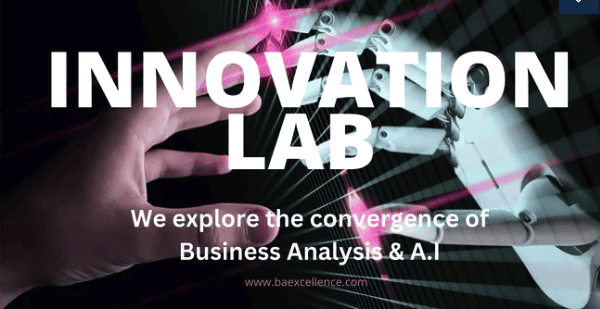Business analyst are required to embrace change and deal with uncertainty. New tools and techniques may come and go and some even prevail as trends and ways of working continue to develop to better satisfy customer needs and problems with desired solutions and outcomes.
One trend that perhaps has been there for along time is that of artificial intelligence (AI) with the rise of ChatGPT the buzz and power of AI is doing its round. AI promises so much and as each generation sees the potential and usage as the technology gets better and better sometimes there is a need to pay close attention and take time to evaluate.
ChatGPT in business analysis can be used to provide efficiencies to the business analyst to reduce repetitive asks and help explore probing questions and essentially bringing together business analysis and artificial intelligence
Table of Contents
What is ChatGPT?
ChatGPT is an advanced artificial intelligence (AI) language model developed by OpenAI
The technology is based on deep learning algorithms and has been trained on a lot of text data, allowing it to generate coherent and contextually relevant responses to a wide range of questions and prompts.
What is the History of ChatGPT?
ChatGPT is part of OpenAI’s ongoing efforts to create advanced AI models that can understand and generate natural language.
The project began in 2018 with the release of GPT-1, a language model trained on a large text data.
Over the years, OpenAI released several more versions each one more advanced and powerful than the last.
In June 2020, OpenAI released GPT-3, which is considered one of the most advanced language models ever created. GPT-3 has over 175 billion parameters and has been trained on an incredibly diverse range of text data.
Why is ChatGPT is so Popular?
ChatGPT is popular for the following reasons:
The technology enables it to understand human language and generate human-like responses to prompts. This makes it incredibly versatile and applicable to a wide range of use cases.
The technology is trained on a large amount of text data, making it one of the most advanced and powerful language models available. This large-scale training allows it to generate highly accurate and contextually relevant responses.
ChatGPT can be fine-tuned and customised for specific use cases, allowing businesses and organisations to tailor its responses to their particular needs and goals.
The technology is available as a cloud-based service, making it easy and convenient for businesses and organisations to integrate into their existing workflows.
ChatGPT is at the forefront of AI language processing and is constantly being improved.
ChatGPT in Business Analysis: How can ChatGPT Help Business Analyst?
AI tools for business analyst such as ChatGPT can help business analysts in a number of ways such as:
Using ChatGPT to analyse data and provide insights. The technology can analyse large amounts of data and provide meaningful insights that can help business analysts
make better decisions.
Can be used to analyse customer interactions and provide insights into customer behaviour. This can help business analysts understand their customers better and improve their products and services accordingly.
Can be used to perform predictive analytics, which means it can analyse data to predict future trends and outcomes. This can be useful for business analysts that want to make strategic decisions based on data.
Can help business analysts conduct market research by analysing data from social media, online forums, and other sources. This can help business analysts understand market trends and consumer behaviour.
How can ChatGPT Help with Current State Analysis?
ChatGPT in business analysis can help business analysts with current state analysis as follows:
Can analyse the data collected and provide insights into the current state. This can help identify any patterns or trends and inform the development of future state recommendations.
Can help visualise the current state data using charts, graphs, and other visual aids. This can help present the data in a more easily understandable format.
Can facilitate collaboration among team members by providing a centralised platform for them to communicate and share their current state analysis. This can help ensure that all team members have a common understanding of the current state and can contribute to the process.
How can ChatGPT Help in Requirements Elicitation?
Here are some ways ChatGPT can help in requirements elicitation:
The technology is capable of understanding natural language inputs, which means stakeholders can express their requirements in a more natural and conversational way. This can lead to supporting the understanding of requirements.
Can help clarify ambiguous requirements – ChatGPT can ask clarifying questions and provide real-time feedback to stakeholders during the requirements elicitation process. This can help identify and clarify any ambiguous requirements, reducing the likelihood of misinterpretation.
ChatGPT can help reduce bias in the requirements elicitation process by providing a neutral and objective interface for stakeholders to express their requirements.
How can ChatGPT Help in Process Modelling?
ChatGPT for business analysis can help in process modelling in several ways, such as:
Can help users describe their processes in a more natural and conversational way. This can lead to more comprehensive and accurate process models.
ChatGPT can ask clarifying questions and provide real-time feedback to users during the process modelling process. This can help identify any unclear or ambiguous processes, reducing the likelihood of misinterpretation.
ChatGPT can validate process models by checking if they meet specific criteria, such as the BPMN criteria (Business Process Model and Notation). This can help ensure that process models are well-designed and effective.
How can ChatGPT Help in Data Modelling
ChatGPT in business analysis can help business analyst in data modelling as follows:
Can help users describe their data models in a more natural and conversational way. This can lead to more comprehensive and accurate data models.
Can ask clarifying questions and provide real-time feedback to users during the data modelling process. This can help identify any unclear or ambiguous data models, reducing the likelihood of misinterpretation.

How can ChatGPT Help in User Story Writing?
ChatGPT can help in user story writing in several ways, such as:
- Can validate user stories by checking if they meet specific criteria, such as the INVEST criteria (Independent, Negotiable, Valuable, Estimable, Small, Testable). This can help ensure that user stories are well-written and effective.
What ChatGPT Prompts are Useful for Business Analysis?
Here are some ChatGPT in business analysis prompts that could be useful for business analysis and business analysts:
- “What are the risks and challenges associated with this project?”
- “What are the potential benefits of implementing a new solution?”
- “How will you measure the success of the new system?”
What ChatGPT Prompts are Useful for Business Analysts for Writing Use Cases
Here are some ChatGPT prompts that could be useful for business analysis and business analysts for writing use cases:
- “Draft use case entitled <use case name>”
- “Can you give me 5 questions to ask for <use case name>”
- “Can you write user stories for this <use case name>”
- “What is the goal of the <use case name> you’re analysing?”
- “Who are the actors involved in the <use case name> and what are their roles?”
- “What are the different steps or actions involved in the <use case name> ?”
- “What are the inputs and outputs of each step in the <use case name>?”
- “What are the specific conditions or exceptions that need to be considered in the <use case name>?”
- “What are the acceptance criteria for the <use case name>?”
- “What are the potential risks or challenges associated with the <use case name>?”
- “How will you prioritise the use cases for development?”
- “What are the dependencies between different use cases?”
- “What are the estimated time and resource requirements for each use case?”
What ChatGPT Prompts are Useful for Business Analysts for Writing User Stories
Here are some ChatGPT prompts that could be useful for business analysis and business analysts for writing user stories:
- “What are the key features and functionality that users need to accomplish their goals?”
- “What are the different user roles and how do they interact with the system?”
- “What are the acceptance criteria for each user story?”
- “What are the potential risks or challenges associated with each user story?”
- “How will you prioritise the user stories for development?”
- “What are the dependencies between different user stories?”
Advantages of a Business Analyst using ChatGPT for Business Analysis
Here are some advantages of ChatGPT for business analysis:
Can help business analysts save time by generating prompts and providing real-time feedback, which can streamline the analysis process.
ChatGPT can help business analysts stay focused and productive, which can lead to higher quality analysis and faster project completion.
Can support business analysts to identify potential risks, dependencies, and requirements that they may have missed otherwise, which can lead to more accurate and comprehensive analysis.
ChatGPT has access to vast amounts of information, which can help business analysts quickly find answers to their questions and gather the information they need to complete their analysis.
Can help ensure that business analysts follow a consistent approach to analysis, which can lead to more consistent and reliable results.
Can aid business analysts communicate their analysis results more clearly and effectively, which can help stakeholders better understand the project’s goals and requirements.
ChatGPT can help business analysts catch errors and inconsistencies in their analysis, which can reduce the risk of project delays and costly mistakes.
Will support business analysts quickly create and test prototypes of new systems, which can speed up the development process and improve the quality of the final product.
Disadvantages of a Business Analyst using ChatGPT for Business Analysis
The following are some disadvantages for a business analyst using ChatGPT:
ChatGPT may not have access to all the context and background information necessary for effective analysis, which can limit its usefulness.
May not be able to interpret or understand the nuances of a particular industry, business, or project, which can limit its ability to provide accurate guidance.
While the technology can generate new ideas and approaches, it may not be as effective as human analysts at thinking outside the box and coming up with truly innovative solutions.
Over reliance on technology can lead to a lack of critical thinking and independent analysis skills in business analysts.
ChatGPT may generate errors or inaccuracies in its prompts or feedback, which can lead to mistakes in the analysis process.
The technology may not be able to fully customise its prompts or guidance to the specific needs of a particular project or client.
ChatGPT may not be fully secure, which can pose a risk to confidential business information.
The tool cannot replace the value of personal interaction and collaboration between business analysts and stakeholders.
- The tool can take time to learn and master, which can be a disadvantage for business analysts who need to quickly adapt to changing project requirements.
What is the Future of ChatGPT?
Here are a few potential directions for the future of ChatGPT:
As research in natural language processing continues to advance, ChatGPT is likely to benefit from these advances, becoming even more accurate and powerful in its ability to understand and generate human language.
As businesses and organisations continue to adopt ChatGPT for a variety of use cases, there is likely to be an increased focus on customising and personalising the model to meet specific needs and goals.
While ChatGPT is already being used in a wide range of industries and fields, there are likely to be many new and innovative use cases in the future, as businesses and developers continue to explore the potential of AI language models.
As ChatGPT becomes more widespread and integrated into existing workflows and applications, it is likely to be integrated with other technologies, such as machine learning, data analytics, and cloud computing, to create even more powerful and advanced applications.
Will ChatGPT Replace Business Analyst?
It is unlikely that ChatGPT or any other AI technology will completely replace a business analyst. While ChatGPT can provide support, insights, and guidance to help streamline the analysis process, it cannot replicate the critical thinking, creativity, and interpersonal skills that are necessary for effective business analysis.
A business analyst plays a crucial role in translating complex business requirements into clear, actionable recommendations for stakeholders. This requires not only a deep understanding of the business domain and the latest technological trends but also the ability to communicate effectively with stakeholders and build strong relationships.
Furthermore, business analysis is not a one-size-fits-all process. Each project has its unique requirements, constraints, and stakeholders, which requires business analysts to adapt their approach accordingly. While ChatGPT can provide general guidance, it may not be able to fully account for these differences.
AI Coffee Catch Up Group
AI coffee catch-up group
The AI coffee catch up group
But it’s not all serious – the group also has fun exploring how AI can boost productivity and transform our daily lives. Regardless of your AI perspective this virtual community is the perfect place to learn, discuss, and connect.
Innovation Lab – AI Tools For Empowered Business Analysts
Embark on an immersive journey where AI tools meet business analysis.
Join a vibrant community
Elevate your skills, stay ahead of the curve, and unlock new possibilities in the world of Business Analysis.
Don’t miss an opportunity to shape your future. Subscribe now and embark on a transformative learning experience





